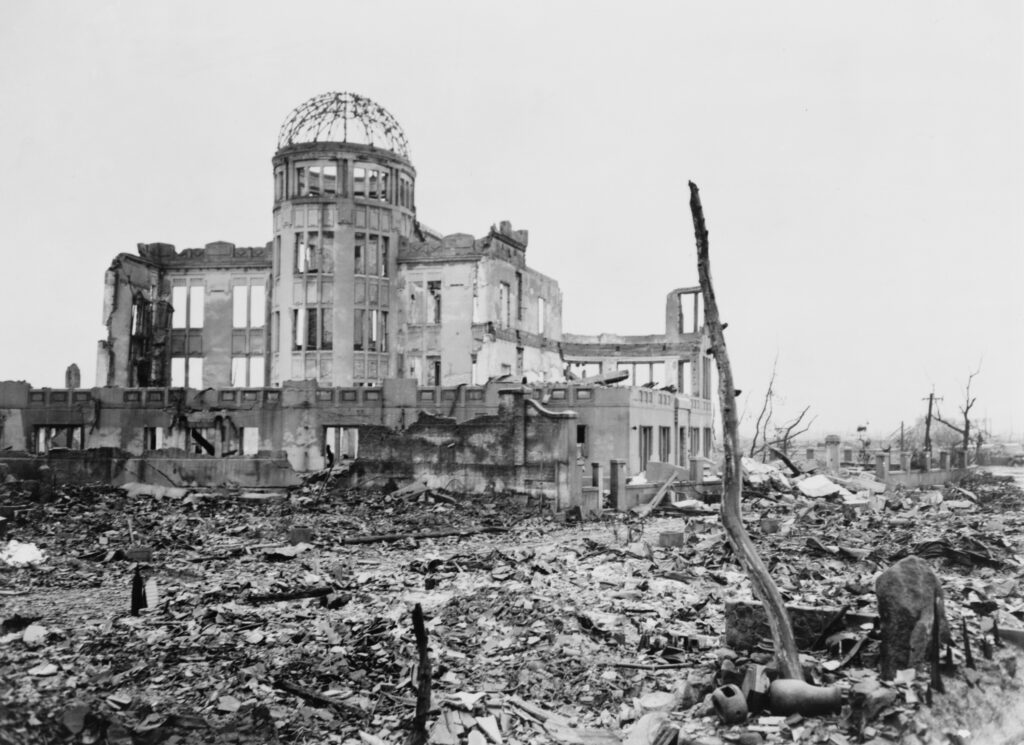
I assume you’ve already read the first part of this story, but if not, click here to read it. Before continuing with the lessons we can draw and what God intends to teach us, let’s briefly revisit the aftermath of the bombings in Hiroshima and Nagasaki.
As I mentioned in the first part, the Allied forces were about to deliver an unforgettable blow to the Japanese forces. But how did it happen?
On August 6, 1945, at 5:55 AM, a Boeing aircraft with the code B-29 Enola Gay took off from the Mariana Islands, cruising at an altitude of 2,800 meters. However, Major Charles William Sweeney, leading the operation, instructed the plane to climb to an altitude of 9,467 meters to avoid damage from rising smoke after the bomb was dropped. At 8:15 AM, the air commandos aboard announced they were ready to strike Hiroshima. At that moment, they dropped a bomb weighing 64 kg, nicknamed “Little Boy.” While the bomb may sound small, catastrophe was about to unfold because it contained uranium, charged with electricity. It took just 43 seconds to reach its target, hitting the city with the force of 15 kilotons, equivalent to 15 million kilograms. The blast alone deafened people within a 5-kilometer radius. To put it into perspective, if the bomb had dropped on the Kigali City Tower (in the city center), anyone near the Kigali Convention Center would have been instantly deafened or killed. If these buildings are unfamiliar, let me illustrate using the western region: If the bomb dropped on Kamembe Market, anyone at Kivu Marina Hotel or the Kamembe Airport would have suffered the same fate. You can imagine the devastation within a 5-kilometer radius from wherever you are. It was pure disaster, and the cries of agony were overwhelming.
Three days later, on August 9, 1945, another plane, the Bockscar, dropped a bomb nicknamed “Fat Boy” on Nagasaki.
That year, 140,000 people died instantly in Hiroshima, and 74,000 died in Nagasaki, meaning nearly half of the population in those cities perished. Due to the radiation from the Hiroshima bomb, 74% of the city’s buildings were instantly set ablaze. In Nagasaki, the radioactive fallout persisted for three days, raining down like a scorching storm at 4,000°C. Ninety percent of the doctors in both cities died, and out of 45 hospitals, only 3 remained standing. If I were to talk about leukemia cases, miscarriages, and other long-term effects, the list would be endless.
Let’s pause the Hiroshima and Nagasaki story and explore what God intends for us to learn from it.
Reading this story stirred two lessons within me: one for families and one for everyday life.
Lesson for Families
I’ve read numerous studies and watched various discussions on the pillars of a strong family, and one of the essential pillars is learning how to communicate effectively. During my training in clinical psychology, I often encountered families seeking divorce, and one of the recurring reasons was poor communication. They would misunderstand each other’s words, just like the “Mokusatsu” incident, where the mistranslation of Suzuki’s statement led to severe consequences. Misunderstandings within families have destroyed many relationships and continue to do so.
Many couples get married out of love, but not all invest in learning how to communicate and truly understand one another. This is one of the leading causes of broken homes. Misunderstanding should not be an opportunity to argue over who is right or wrong, but rather a moment to better understand each other—what should or should not be done. It is not about proving who’s right but about growing in mutual understanding (read carefully). This is why some prayers go unanswered, and it feels as though God has left these homes, and replaced by constant arguing and bitterness. Edwin Friedman, in his book Leadership in the Age of Quick Fix, stated that one of the reasons spouses live unhappily is due to their tendency to keep silent about issues instead of addressing them openly.
Lesson for Everyday Life
During one of my communication courses, the instructor once said, “When you speak, don’t just check if the listener heard you, but also ensure they understood what you meant to say.” Throughout my experiences, whether interacting with young or older people, the most painful mistakes I’ve made have been due to not mastering the art of communication. You may read this story and feel it doesn’t apply to you, thinking what you said was clear. But if it was so clear, why did it lead to conflict instead of harmony? Is it because others refuse to accept the truth? Maybe, but have you taken the step to apologize? Perhaps your conscience is troubling you, but heed what the Spirit is guiding you to do.
Conclusion
Just as the misunderstanding of the word “Mokusatsu” led to the destruction of Hiroshima and Nagasaki, failing to understand what your spouse is truly trying to say has destroyed countless families. God desires that we rise above history, wounds, origins, and differing mindsets to learn how to communicate effectively, based on the Word, to foster true unity in both family and spirit. Many companies fall apart, and relationships crumble because of a lack of understanding in communication—people only hear what they want to hear. The secret to truly listening is paying attention to others, not focusing on what they haven’t done for you but reflecting on what you have done for them, for which you will be accountable.
The mistake we often make in conversations is that we don’t listen to understand but listen to respond—Steven Covey. I would also add: “The problem is that, in discussions, we focus more on what we are about to say after the other person finishes, rather than truly focusing on what they are saying to us.”


